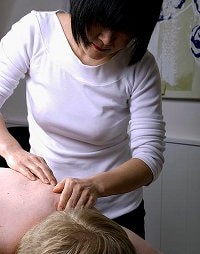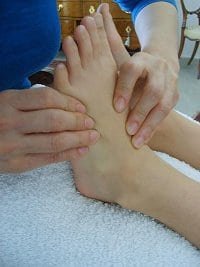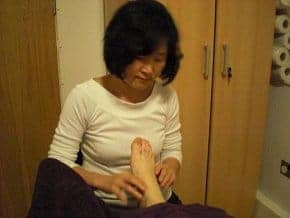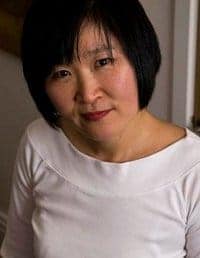A reflexologist is an alternative medicine practitioner who massages a patient’s feet, hands and ears in order to unblock corresponding energy channels in the body and bring about positive change in their state of well-being.
Reflexology is based on 5000 year old Chinese health principles and the notion that within the body essential life energy (Qi) flows along invisible channels, nourishing the body and spirit.
Reflexology states that each area of the body, each organ and system, has a corresponding reflex zone located on the hands and feet.
Via massage of these zones energy channels can be unblocked, stimulated or calmed depending on the symptoms displayed by the patient.
Forms of reflexology have also been found to have existed among North American indigenous peoples and the ancient Egyptians.
Modern day reflexology owes much to studies carried out in the early 20th century by the physiotherapist Eunice D Ingham.
Salary
- A reflexologist starting out is likely to earn from £11,000 – £14,000 per annum.
- An experienced reflexologist with a good client base can earn between £20,000 – £35,000 per annum.
- A reflexologist who runs their own clinic with other employees on the payroll may earn upwards of £35,000 per annum.
Many reflexologists are self-employed and their income depends on how many clients they see, as such the above figures are intended as a guideline only.
Responsibilities
A reflexologist has the following set of responsibilities:
- Meeting with clients and conducting an initial assessment.
- Explaining to new clients the principles and methods of reflexology.
- Applying hands-on massage to patient’s feet and to a lesser extent their hands and ears.
- Instructing the client in self-reflexology techniques to be practised at home.
- Keeping detailed patient notes.
- Setting out a plan of future treatment.
- Advising patients to seek mainstream medical treatment where necessary.
Qualifications
There are several nationally recognised qualifications in reflexology.
They all contain a mixture of theory, technique and hands-on practice.
There are also many privately run reflexology courses which, while being comprehensive, are not nationally recognised.
This can limit their usefulness as professional qualifications.
The following nationally recognised reflexology qualifications can be studied full or part-time, depending on the providing institution:
- ITEC Level 3 Diploma in Reflexology
- City & Guilds Level 2 Diploma in Basic Reflexology Techniques
- City & Guilds Level 3 Diploma in Reflexology
Once qualified a reflexologist may apply for registration on the Complimentary and Natural Healthcare Council (CHNC) which is supported by the UK Department of Health.
A reflexologist will also need professional liability insurance in order to work in most clinics.
Skills
A reflexologist will need the following skill-set:
- Patience and empathy to listen to other people’s problems.
- Ability to see to the root problem amongst a host of interrelated issues.
- A good understanding of healthy living practices.
- The ability to inspire confidence in others.
- The ability to develop mentoring, caring relationships with others.
- Excellent organisational and book-keeping skills.
- The ability to recognise the limit of one’s own abilities and the appropriate time to refer a patient to another healthcare professional.
Working Conditions

Reflexologists predominantly work within a clinical setting, usually within an an alternative medicine practice offering other therapies such as Reiki, Massage, Aromatherapy etc.
Often reflexologists travel to see patients in their own homes or places of work.
As in many alternative healthcare roles there are currently more female reflexologists than male.
However an increasing number of men are entering the alternative medicine industry as public perception changes and such therapies gain wider recognition.
In addition to the special techniques of reflexology, creams and salves may be applied to feet in order to bring about soothing, warming or healing effects.
Hours can be long and early morning, weekend or evening work is common in order to attend to clients outside of office hours.
The work is hands-on so it can by physically tiring though not to the extent of full body massage.
Dealing with other people’s problems can also be emotionally draining.
However, helping people and bringing about positive change in their well-being is immensely rewarding and most reflexologists do the work for this reason, rather than being motivated by financial gain.
Experience
A reflexology course includes a large amount of hands-on work.
Additionally, a student will be required to take on case-studies – trial patients of whom a detailed record of symptoms, treatment and results must be compiled.
Thus a graduating reflexologist will be ready to begin practice right away.
Employers
Private complimentary or alternative healthcare clinics are the major employers of reflexologists, check your local listings and apply directly.
Additionally many reflexologists start up their own businesses, working from their own home or that of their patient and advertising themselves in local shops, newspapers and on the Internet.
Career Progression
Many reflexologists are qualified in another alternative therapy, commonly massage, reiki healing or acupressure.
This allows them to treat a wider range of patients, offer a more extensive program of care and facilitate a higher and more regular income for themselves.
Business minded reflexologists may go on to start up their own clinic, where they can hire out rooms to, or directly employ, other alternative medicine practitioners.
Image

Also known as…
- Zone therapist
Related Jobs
- Acupuncturist
- Massage therapist
- Aromatherapist
What’s it really like?

Kyoungjin Ha, 40 years old, is a reflexologist, holistic and Japanese face-lift massage therapist and Reiki healer specialising in maternity.
She is based in London.
Hi Kyoungjin, how long have you been working in the alternative medicine industry?
I’ve been doing this for ten years now.
I started with reflexology first in 1999 and then I did a massage course after.
It has been about seven years since I started working in the shop, Reflections, in Chelsea.
Back then I did mostly reflexology, now I’m doing massage also about half of the time.
I started part-time, working mainly in the evenings by hiring out a room.
When I first moved to England I started being curious and I did a 10 week introductory course in reflexology.
I was fascinated by this way of treating people.
The teacher was inspirational and his methods really worked.
I practised very hard and learnt a lot with him.
What did you do before you became a reflexologist?
I came to England in 1997 from Seoul in Korea where I was teaching English in primary and high school.
At first I was a student in a language school studying English as a foreign language, then I studied an art and design access course at Richmond Adult College.
Because of visa restrictions I had to be a full time student, so although my main interest was in reflexology I was studying several courses at once.
What do you do in a typical day at work?
The shop opens quite late so most of the time I start about 10 or 11.
I usually see between three to five clients in a single day for a mix of things, either massage or reflexology.
It can be four or five hours work in one place or a number of different places.
Sometimes I travel to treat people in their homes.
I often travel to people’s homes, offices or see them in the clinic.
For first-time clients we do an initial consultation, to discover what kind of pain or tension they are suffering from and see what area we need to focus on.
After the first session I know the person very well so I can carry on working for them.
Usually we do repeat sessions, once they see me they are likely to become regular clients.
It can be once a week or once a month. It depends on the person but they usually come back to me.
Sometimes pregnant women want to see me before labour at least a couple of times.
I specialise in pre-natal and antenatal. Often women want reflexology just before the birth.
It helps unblock energy channels, tension and the baby coming out, especially when they are overdue.
Usually after reflexology the baby comes in one or two days.
In terms of accounts I have an accountant to sort out all the paper work for me.

What do you like about being a reflexologist?
It’s very rewarding, I can help people get better.
I feel a very lucky person in this job.
It is tiring but I love it.
A lot of people need me so I have to juggle my time efficiently.
My clients really appreciate the changes I bring about in them and that makes me feel good.
Is there anything that you dislike about being a reflexologist?
Well, yes.
It’s very physical, particularly massage and it can cause physical problems in me.
I can get tension and pain in my body. I then need to have a massage myself.
I have to be very careful and say no to clients when my body says it’s too much and I have to do regular exercise like yoga and Pilates.
In massage you need to be relatively strong and use good technique to keep yourself going.
What advice would you give to someone thinking about becoming a reflexologist?
You really need to be fit, so you have to exercise regularly and eat very well.
You really need to look after yourself.
If your job is looking after other people, then you really need to look after yourself.
What job do you think you might do after this role in terms of career progression?
I’m actually trying to open up my own shop.
I’m searching for a premises now.
I want to own a holistic or complimentary medicine centre and move into the managerial side of things.
However I will keep some private clients still, ones that I have been seeing for many years, I can’t just abandon them!
What other inside-information can you give to help people considering this career?
You have to keep up to date with your skills.
There’s a lot of competition so you have to keep going for gold, keep learning more and don’t over-work yourself.
Do you mind us publishing your salary – this is very helpful for job seekers?
It’s difficult to be precise because earnings can vary depending on how busy you are.
I would say from £25.000 to £35,000 per year.
When you start you can’t expect that, you will need to build up your client base over time.








